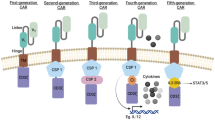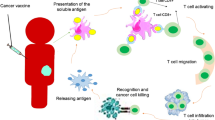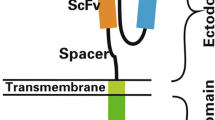Summary
It was found that sublethal (550 rad) whole-body γ-irradiation of mice bearing established immunogenic tumors enabled tumor-sensitized spleen cells infused intravenously 1 h later to cause complete tumor regression in all mice. In contrast, γ-irradiation alone caused only a temporary halt in tumor growth, and immune cells gave practically no therapeutic effect at all. This result was obtained with the SA1 sarcoma, Meth A fibrosarcoma, P815 mastocytoma, and P388 lymphoma. Additional experiments with the Meth A fibrosarcoma revealed that the spleen cells from tumor-immune donors that caused tumor regression in γ-irradiated recipients were T cells, as evidenced by their functional elimination by treatment with anti-Thy-1.2 antibody and complement. It was shown next that adoptive T-cell-mediated regression of tumors in γ-irradiated recipients was inhibited by an intravenous infusion of spleen cells from donors with established tumors, but not by spleen cells from normal donors. The spleen cells that suppressed the expression of adoptive immunity were functionally eliminated by treatment with anti-Thy-1.2 antibody and complement. Moreover, they were destroyed by exposing the tumor-bearing donors to 500 rad of γ-radiation 24 h before harvesting their spleen cells. The results are consistent with the interpretation that γ-radiation facilitates the expression of adoptive T-cell-mediated immunity against established tumors by eliminating a population of tumor-induced suppressor T cells from the tumor-bearing recipient.
Similar content being viewed by others
References
Berendt MJ, North RJ (1980) T cell-mediated suppression of antitumor immunity. An explanation for progressive growth of an immunogenic tumor. J Exp Med 151:69
Dye ES, North RJ (1981) T cell-mediated immunosuppression as an obstacle to adoptive immunotherapy of the P815 mastocytoma and its metastases. J Exp Med 154:251
Dye ES, North RJ (1983) Specificity of the T cells that express and suppress adoptive immunotherapy of established tumors. J Reticuloendothel Soc (in press)
Dye ES, North RJ, Mills CD (1981) Mechanisms of antitumor action of Corynebacterium parvum. 1. Potentiated tumor-specific immunity and its therapeutic limitations. J Exp Med 154:609
Eberlein TJ, Rosenstein M, Rosenberg SA (1982) Regression of a disseminated syngeneic solid tumor by systemic transfer of lymphoid cells expanded in interleukin 2. J Exp Med 156:385
Enker WE, Jacobitz JE (1980) In vivo splenic irradiation eradicates suppressor T cells causing the regression and inhibition of established tumors. Int J Cancer 25:819
Fernandez-Cruz E, Gilman SC, Feldman JD (1981) Immunotherapy of a chemically-induced sarcoma in rats: Characterization of the effector T cell subset and nature of suppression. J Immunol 128:1112
Frost P, Prete P, Kerbel R (1982) Abrogation of the in vitro generation of cytotoxic-T cell response to a murine tumor: the role of suppressor cells. Int J Cancer 30:211
Hellström KE, Hellström I, Kant JA, Tamerius JD (1978) Regression and inhibition of sarcoma growth by interference with a radiosensitive T cell population. J Exp Med 148:799
Mills CD, North RJ (1983) Expression of passively transferred immunity against an established tumor depends on generation of cytolytic T cells in recipient: Inhibition by suppressor T cells. J Exp Med 157:1448
North RJ (1982) Cyclophosphamide-facilitated adoptive immunotherapy of an established tumor depends on elimination of tumor-induced suppressor T cells. J Exp Med 155:1063
North RJ, Dye ES, Mills CD, Chandler JP (1982) Modulation of antitumor immunity — Immunobiologic approaches. Springer Semin Immunopathol 5:193
Rosenberg SA, Terry WD (1977) Passive immunotherapy of cancer in animals and man. Adv Cancer Res 25:323
Takei F, Levy JG, Kilburn DG (1976) In vitro induction of cytotoxicity against syngeneic mastocytoma and its suppression by spleen and thymus cells from tumor-bearing mice. J Immunol 116:288
Takei F, Levy JG, Kilburn DG (1977) Chatacterization of suppressor cells in mice bearing syngeneic mastocytoma. J Immunol 118:412
Author information
Authors and Affiliations
Additional information
Supported by Grants CA-16642 and CA-27794 from the National Cancer Institute, a Grant-in-Aid from R. J. Reynolds Industries, Inc. and Grant RR-05705 from the Division of Research Resources, NIH
Rights and permissions
About this article
Cite this article
North, R.J. γ-Irradiation facilitates the expression of adoptive immunity against established tumors by eliminating suppressor T cells. Cancer Immunol Immunother 16, 175–181 (1984). https://doi.org/10.1007/BF00205425
Received:
Accepted:
Issue Date:
DOI: https://doi.org/10.1007/BF00205425




